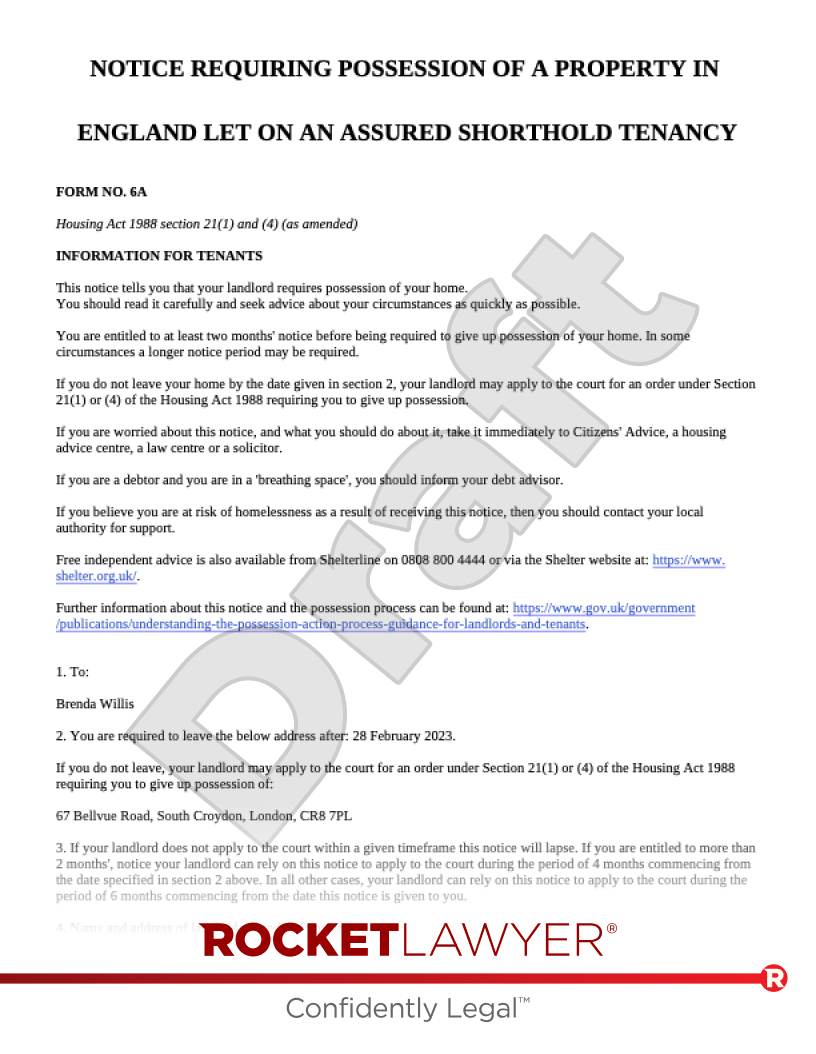Action |
(✔) |
| Identify why you’re evicting the tenant. A Section 21 notice should be used if you want the property back at the end of its fixed term (ie where the initial term of the tenancy has ended). If the tenant has broken any terms of the tenancy agreement (eg rent arrears, property damage, anti-social behaviour), you should use a Section 8 notice. |
|
| Ensure you (or your agent) keep records and all evidence that you have complied with the requirements to serve a Section 21 notice. |
|
| Understand that a Section 21 notice can only be served if all the below apply:
If one or more of these requirements are not met, Ask a lawyer for guidance. |
|
| Calculate the correct notice period. Make sure to consider:
The end date of the notice should be after the last day of the fixed term of the tenancy. For example, if a 12-month tenancy started on 1 April 2020, you would not be able to serve notice until after four months have passed (ie after 1 August 2020). Further, the end date of the notice should be after the end of the tenancy (ie after 1 April 2021). |
|
| Understand that if you’re serving a Section 21 notice during a periodic tenancy, the 2 months’ notice period is the same provided the tenancy runs on a weekly or monthly basis (based on when the rent is paid). If the tenancy runs on a quarterly, bi-annually or annual basis, then you will need to give the appropriate matching notice period, with a biannual or annual tenancy requiring 6 months' notice (the maximum notice). Read Ending a periodic tenancy for more information. |
|
| Once you’re confident this eviction notice is right for you, create a Section 21 notice. A valid Section 21 notice should include:
|
|
| Read the accompanying notes for Form 6A to make sure that you've followed the correct procedure before serving (ie sending or giving to the tenants) your Section 21 notice. |
|
| The notice is deemed to be 'served' when the tenant actually receives it. You may need to allow extra time depending on the way you choose to deliver the notice. It's best to keep any evidence or proof of this. You can serve the notice by:
|
|
| Calculate if the tenant is entitled to a repayment of some of the rent paid. This will depend on when rent is paid and when the tenant leaves the property. For example, if the tenant pays rent in advance on the first day of the month (eg rent is paid on 1 April) and the Section 21 notice states that the tenant is to leave in the middle of the month (eg by 15 April), then the tenant is entitled to have the rent proportionally paid back to them. This is because the tenant has paid rent for the full month, but has been told to leave partway through the month. |
|
| Understand that if the tenants have not left after the expiry of the notice period you may have to apply for an Accelerated Possession Procedure. Read Enforcement of possession orders for more information. |
Whilst evictions seem to be straightforward, they can get complicated. Read Repossessing property - section 21 notices, Tenant eviction FAQs, What to do if a tenant has abandoned the property and How to evict a tenant to find out more.
Eviction can be complicated. If you want help, try out our tenant eviction service where our lawyers can help ensure you comply with the law. If you have any questions or concerns about the eviction process, do not hesitate to Ask a lawyer.




